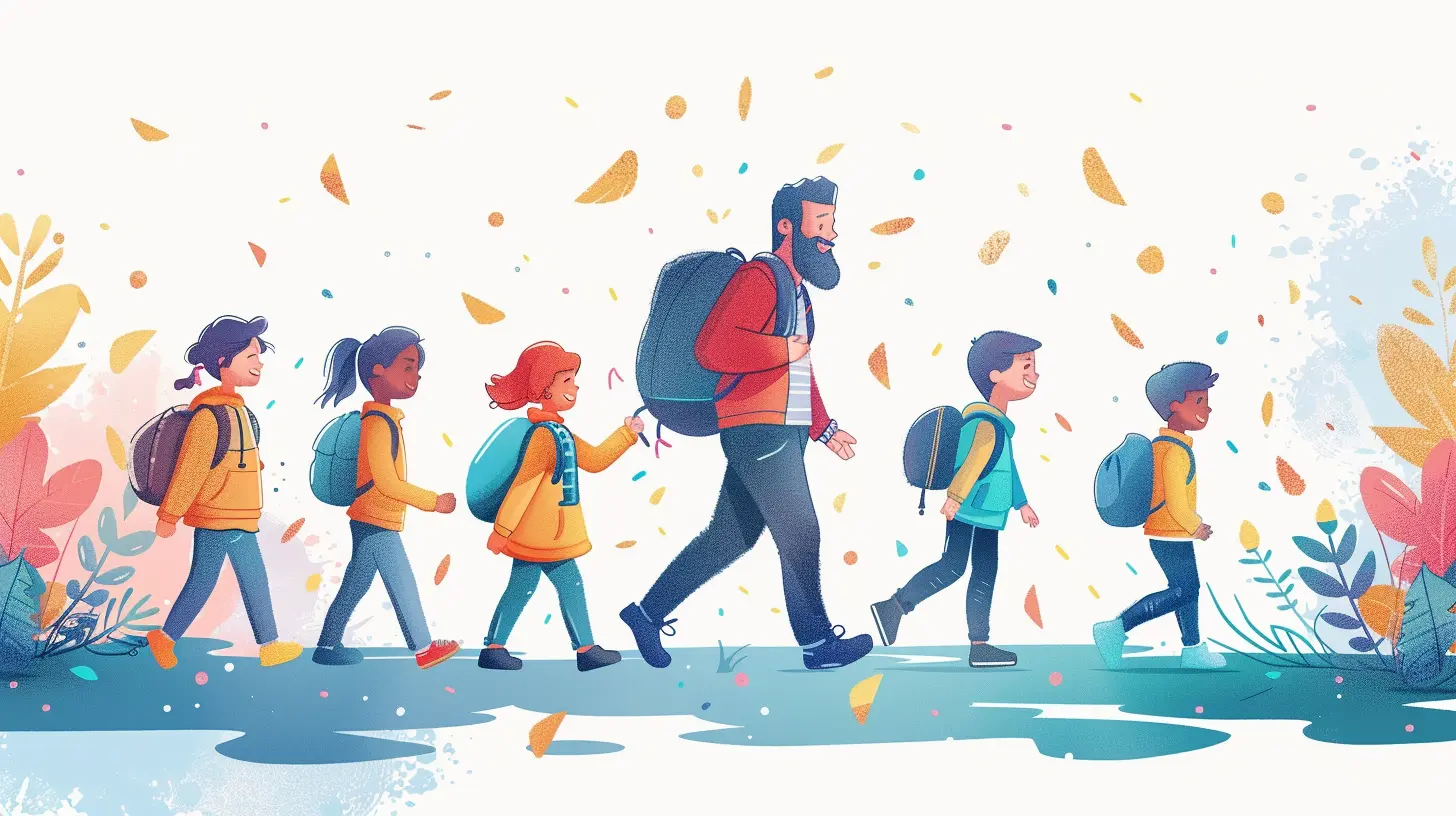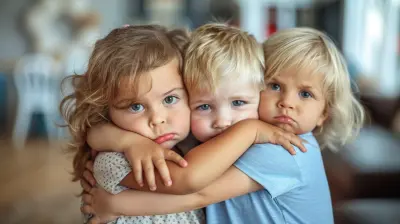Empowering Kids to Make Smart Choices in Online Communities
8 September 2025
Let’s be real: kids today are growing up in a wild, wild digital world. Online communities are everywhere—YouTube comments, Discord servers, TikTok DMs, gaming chats, and don’t even get me started on forums with usernames like xX_ShadowNinja420_Xx. If you’re a parent, you’ve probably wondered how in the pixelated planet your child is supposed to navigate this vast internet jungle safely and smartly.
Well, breathe easy, my friend. This isn’t about banning screen time or becoming a helicopter parent with a headset. Nope. This is about giving our kids the tools, confidence, and critical thinking skills to thrive online. Empowerment over restriction. Smart choices over blind scrolling. So buckle up, grab a snack, and let’s chat about how to raise mindful mini internet-users without turning your dining table into a digital battlefield.
Why Smart Online Choices Matter (Like, A LOT)
Imagine sending your kid off to a new school where no one wears name tags, there are no rules, and anyone can sneak into the cafeteria. Kinda sketchy, huh? That’s the internet. Online communities can be amazing places for creativity, friendship, and learning—like the Hogwarts of hobbies—but they also come with dark alleys and digital dementors.The choices kids make online can impact their safety, self-esteem, and even their future (hello, that TikTok from 7th grade could resurface during a job interview in 2035). Empowering them now means fewer messes to clean up later.
Start With the Basics – What Are Online Communities, Anyway?
Before we go full cyber-mentor mode, let's actually define the thing. Online communities are groups of people who interact through the internet around shared interests, goals, or identities. Think:- Roblox groups building virtual cities.
- Reddit threads dissecting Taylor Swift lyrics.
- Minecraft servers designing utopias.
- Discord chats planning anime-watching marathons.
Each community has unspoken rules, vibes, and dynamics that make them unique—and sometimes, complicated. What’s normal in a Fortnite group chat might be totally out of line in an educational forum. Helping your child spot those differences is key.
Tip #1: Keep the Conversation Open and Judgment-Free
Ever try to get blood from a stone? That’s what it’s like asking a kid about their online life if they think you’ll flip your lid. The trick? Keep the convo chill, curious, and continuous.Instead of grilling them like a digital detective, try:
- “What’s your favorite game server right now? Can you show me around?”
- “Have you ever seen someone being mean online? What did you think about that?”
- “If someone says something weird in a chat, what do you usually do?”
Kids open up when they know they won’t be punished for honesty. Keep the lines of communication wide open, like a Starbucks with free Wi-Fi.
Tip #2: Show, Don’t Just Tell
Kids learn by watching. So if your idea of an online interaction is rage-commenting on Facebook politics, maybe dial that down before giving your kid a lecture on digital kindness.Walk the walk:
- Model respectful disagreements on social media.
- Set boundaries for screen time and stick to them yourself.
- Share your own experiences—both positive and not-so-great—with online communities.
Let them see how you interact online thoughtfully. You’re not just a parent; you’re the Wi-Fi warrior they look up to.
Tip #3: Teach the Magic Words — THINK Before You Post
Ask your kid to imagine the internet as a giant wall covered in permanent marker. Everything they type or share sticks—so what do they want the world to read?Use the THINK acronym:
- T - Is it True?
- H - Is it Helpful?
- I - Is it Inspiring?
- N - Is it Necessary?
- K - Is it Kind?
Simple? Yes. Silly? Maybe a little. Effective? Like peanut butter and jelly. These five little questions can be the difference between a thoughtful comment and a digital “oops” that follows them forever.
Tip #4: Role-Play The “What Would You Do?” Scenarios
Kids love games, right? So turn tricky online situations into a sort of digital “choose your own adventure.”Try scenarios like:
- “You’re in a group chat and someone starts bullying another kid. What would you do?”
- “You get a weird message from someone you don’t know offering freebies. What’s your next move?”
- “Your friend shares a really personal photo of themselves. Should you repost it?”
Make it fun and interactive. Toss in a few wild curveballs to keep it interesting. Maybe add in a bad guy named Captain Clickbait. Why not?
Tip #5: Set Expectations, Not Just Rules
Rules are helpful, but expectations build character. Anyone can follow rules to avoid punishment—but teaching your child to take pride in smart choices? That’s gold.Talk about values:
- “In our family, we treat people kindly—online and offline.”
- “Your digital actions are like your reputation. Protect it.”
- “Be the kind of community member you’d want to meet.”
When kids understand the why behind a boundary, they’re way more likely to respect it (and not just find sneaky ways to bypass it).
Tip #6: Help Them Spot Red Flags (AKA Online Ickiness)
Teach your child to become a cyber-sleuth. They need to know how to notice when something online feels off. Red flags might include:- Users who ask for personal photos or info.
- Communities that normalize bullying or toxic talk.
- Too-good-to-be-true offers (Spoiler alert: No, you didn’t win an iPhone just for clicking).
- Adults trying to be too friendly too fast.
If it quacks like a scam and waddles like a predator, it's probably best to exit the chat. Encourage your kid to tell you about any red flags and reassure them that you won’t freak out. You’re their safety net, not the panic projector.
Tip #7: Teach the Golden Rule of Screenshots
Nothing is ever really gone from the internet—even if you delete it. So before sending that snap, emoji, or spicy meme, your kid should ask themselves one question:> “Would I be okay if this ended up on a school bulletin board?”
Screenshots are forever. Friends can turn into frenemies. Group chats can get leaked. In online communities, trust is important—but cautious trust is smarter.
Tip #8: Encourage Digital BFFs… With Boundaries
Online friendships can be awesome. Some of your kid’s besties might live in another time zone—and that’s okay! But they still need to know the boundary line between friendly and too friendly.Lay down some classic rules:
- Never share your home address, school, or phone number.
- Avoid voice/video chats with strangers unless you’re around.
- Don’t meet anyone in real life without your parents’ involvement.
Remind your kid that just because someone uses the same Roblox skin doesn’t mean they’re trustworthy. Teach them to trust their gut and never feel bad about blocking someone who gives them the heebie-jeebies.
Tip #9: Celebrate Their Smart Choices
Catch them making good digital decisions? Hype them up like they just won an Oscar. 🎉- “That was so mature of you to leave that toxic chat.”
- “I’m proud you told me about that sketchy message.”
- “I love how you encouraged that kid in your group.”
Positive reinforcement turns good habits into lifelong principles. Plus, every kid loves praise sprinkled with love and a side of chocolate chip cookies.
Tip #10: Keep Evolving With Them
Here’s the deal—what’s relevant today might be ancient history in six months (remember Club Penguin?). So don’t assume you’ll always be ahead of the tech curve. Stay in the loop:- Ask your kid to teach you the latest app.
- Join parenting tech groups online.
- Read up on new platforms your kid is using.
Make it a partnership rather than a lecture series. You’re growing together—digitally and emotionally.
Final Thoughts: Empower, Don’t Overpower
At the end of the day, our goal isn’t to bubble-wrap our kids with firewalls and parental controls. It’s to empower them—to trust their instincts, make good choices, and know when to ask for help.Kids can thrive in online communities. They can build friendships, learn new things, and express themselves in ways you never imagined possible. All they need is the right guidance, a little faith, and sometimes, a well-timed dad joke.
So go ahead—log in, scroll with purpose, and raise mini humans who are just as smart online as they are off-screen.
all images in this post were generated using AI tools
Category:
Online SafetyAuthor:

Austin Wilcox
Discussion
rate this article
1 comments
Wren McVaney
Empower your kids with confidence; they're the superheroes of their online adventures! 🌟
September 28, 2025 at 2:34 AM

Austin Wilcox
Absolutely! Encouraging confidence in kids helps them navigate online spaces wisely and responsibly. 🌟


